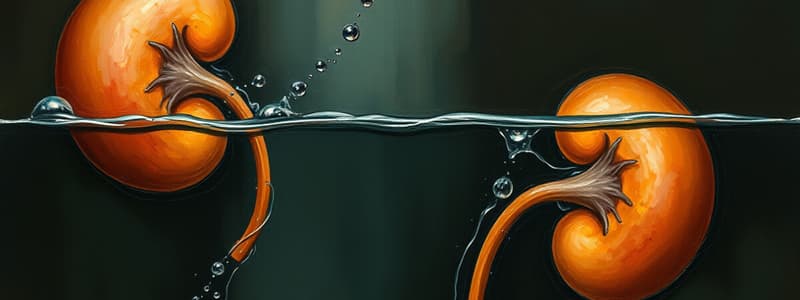Podcast
Questions and Answers
What is the primary function of antidiuretic hormone (ADH) in the kidneys?
What is the primary function of antidiuretic hormone (ADH) in the kidneys?
- Decreases blood pressure
- Increases urine output
- Promotes water reabsorption (correct)
- Stimulates the release of renin
What occurs as a result of dehydration in terms of urine concentration?
What occurs as a result of dehydration in terms of urine concentration?
- Urine production stops completely
- Urine becomes hypotonic
- Urine becomes less concentrated
- Urine becomes highly concentrated (correct)
How do kidneys contribute to maintaining water balance?
How do kidneys contribute to maintaining water balance?
- By constantly diluting all filtrate
- By absorbing over 99% of filtered water (correct)
- By exclusively secreting excess electrolytes
- By producing urine with consistent volume
What is the condition known as diabetes insipidus characterized by?
What is the condition known as diabetes insipidus characterized by?
What mechanism helps with urine concentration in the kidneys?
What mechanism helps with urine concentration in the kidneys?
What effect does the absence of ADH have on urine?
What effect does the absence of ADH have on urine?
Which structure in the kidney is primarily responsible for the reabsorption of solutes that contributes to hypotonic filtrate?
Which structure in the kidney is primarily responsible for the reabsorption of solutes that contributes to hypotonic filtrate?
Which type of diabetes insipidus is caused by a deficiency in ADH production?
Which type of diabetes insipidus is caused by a deficiency in ADH production?
Flashcards are hidden until you start studying
Study Notes
Kidney Functions and Importance
- Kidneys play crucial roles: regulation of water balance, acid-base balance, and waste excretion.
- Understanding terms: glomerular filtration rate (GFR), renal tubules, tubular glomerular feedback, and renin-angiotensin-aldosterone system is essential before diving deeper.
Water Balance Regulation
- Kidneys help maintain water balance and prevent dehydration; over 99% of filtered water is reabsorbed.
- In dehydration, kidneys produce highly concentrated urine (up to six times blood concentration).
- When excess fluid is consumed, kidneys induce diuresis to expel excess urine.
Osmoregulation
- Active regulation of fluid and electrolytes is known as osmoregulation, primarily managed by kidneys.
- Counter-current exchange occurs between the vasa recta and Loop of Henle, facilitating urine concentration.
- Renal medullary interstitium aids in water reabsorption back into blood from urine.
Filtrate Dilution Process
- By the time filtrate reaches the distal convoluted tubule and collecting duct, it becomes hypotonic (dilute).
- Reabsorption of solutes (not just water) in the Loop of Henle contributes to hypotonic filtrate.
- Hormone ADH (antidiuretic hormone) plays a pivotal role in urine concentration.
Role of ADH
- ADH is released in response to increased blood osmolality, promoting water reabsorption in kidneys.
- It makes distal convoluted tubules and collecting ducts permeable to water, concentrating urine.
- Absence of ADH results in the production of dilute urine due to impermeability of kidney segments.
Diabetes Insipidus
- Diabetes insipidus is characterized by an inability to concentrate urine due to insufficient ADH or kidney response to it.
- Two types exist: central diabetes insipidus (deficiency in ADH production) and nephrogenic diabetes insipidus (kidneys unresponsive to ADH).
- Administration of exogenous ADH helps differentiate between types; response indicates central diabetes insipidus.
Summary of Key Processes
- Osmoregulation ensures fluid/electrolyte balance, with kidneys monitoring blood osmolality via osmoreceptors.
- The release of ADH allows the reabsorption of water and dilution of blood, crucial for maintaining homeostasis.
- Failure to respond to ADH leads to diabetes insipidus and results in persistent dilute urine production.
Kidney Functions and Importance
- Kidneys regulate multiple essential functions, including water balance, acid-base balance, and waste excretion.
- Familiarity with key concepts: glomerular filtration rate (GFR), renal tubules, tubular glomerular feedback, and the renin-angiotensin-aldosterone system is crucial for understanding kidney physiology.
Water Balance Regulation
- Kidneys maintain water balance and prevent dehydration; they reabsorb over 99% of filtered water.
- In states of dehydration, kidneys produce urine that is highly concentrated, potentially up to six times the blood's concentration.
- During excessive fluid intake, kidneys promote diuresis to eliminate the surplus urine.
Osmoregulation
- Osmoregulation describes the active management of fluid and electrolyte levels by the kidneys.
- The counter-current exchange mechanism between the vasa recta and the Loop of Henle plays a key role in concentrating urine.
- The renal medullary interstitium assists in reabsorbing water back into the bloodstream from urine.
Filtrate Dilution Process
- Filtrate becomes hypotonic (dilute) as it passes through the distal convoluted tubule and collecting duct.
- The Loop of Henle facilitates solute reabsorption, contributing to the dilution of the filtrate.
- Antidiuretic hormone (ADH) is vital for the concentration of urine.
Role of ADH
- ADH is released when blood osmolality increases, stimulating water reabsorption in the kidneys.
- It increases the permeability of distal convoluted tubules and collecting ducts to water, leading to concentrated urine.
- Lack of ADH results in the formation of dilute urine due to the impermeability of certain kidney segments.
Diabetes Insipidus
- Characterized by the inability to concentrate urine due to inadequate ADH or kidney response to it.
- Two types exist: central diabetes insipidus, marked by a deficiency in ADH production, and nephrogenic diabetes insipidus, where kidneys do not respond to ADH.
- Administering exogenous ADH can help differentiate the two types; a positive response indicates central diabetes insipidus.
Summary of Key Processes
- Osmoregulation is critical for maintaining fluid and electrolyte balance, with kidneys continuously monitoring blood osmolality through specialized osmoreceptors.
- The secretion of ADH promotes water reabsorption and dilution of blood, essential for homeostasis.
- Non-responsiveness to ADH results in diabetes insipidus, causing persistent production of dilute urine.
Studying That Suits You
Use AI to generate personalized quizzes and flashcards to suit your learning preferences.


